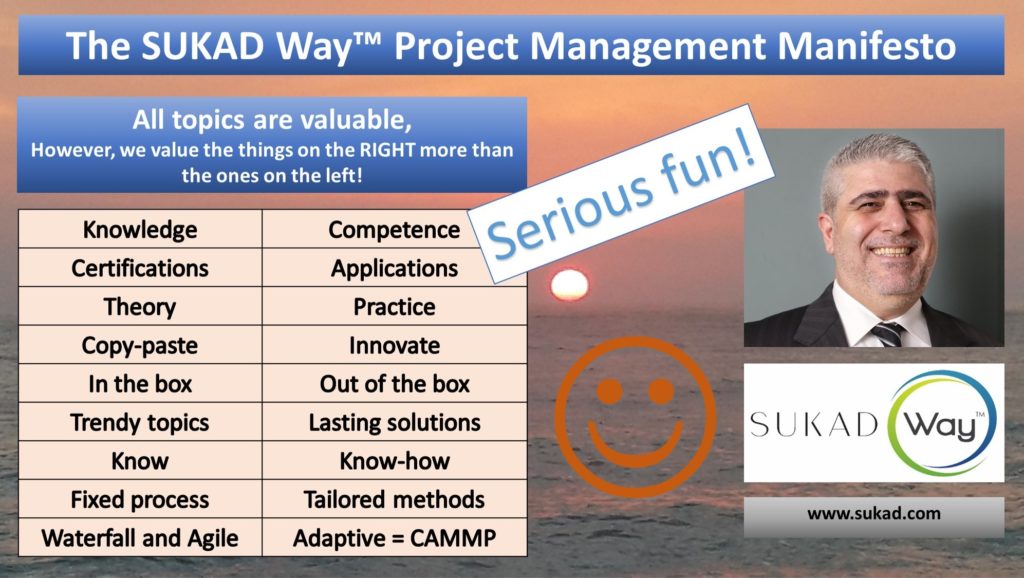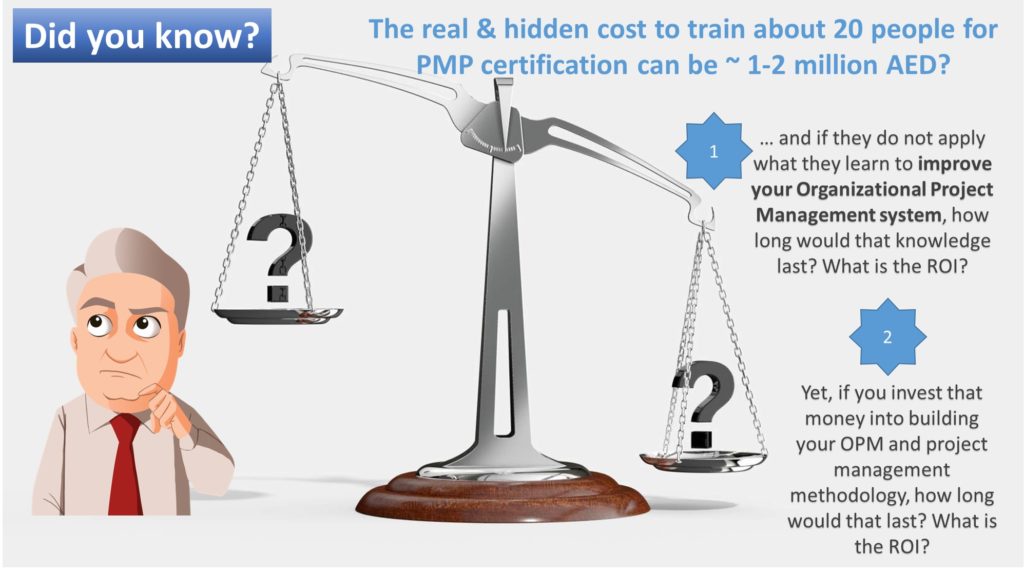Over the years, SUKAD has been promoting that organizations should build their organizational project management system, including project management methodological approach. We also know that when it comes to PMP Certification; we are not only going against the popular trends and swimming against the PM Main Stream, we are moving against strong undercurrents; if not trying to break walls. In other words, one can only imagine the challenge. Yet, we believe that although the PMP still has value, PMOs, projects development, human resources, and organizational developments executives should consider investing into building tailored project management methodological approach rather than PMP certification. Our view is not limited to the PMP but to all generic certifications, although we focus on the PMP because it is the most popular and cause a craze.
Once again, our position from the start is to build the organizational project management system (OPMS) and invest in building tailored project management methodological approach; rather than PMP certifications. The repetition is for emphasis. Why is this our position? We have many reasons, we will address what we can here.
We will come back to our recommendation at the end of this article.
PMP Certification
Sure, the PMP certification has value, and sure it is in high demand even top certification in the IT industry. But, let us ask an indirect question, with a background. First, the background: Can we agree that until recently, the PMP did not address agile/Agile concepts? Agile was not even a core topic in the PMBOK Guide until the sixth edition, which was released about 9 months ago. Even though the guide now addresses agile and even have an agile practice guide linked to it, agile is still not a core focus in the PMP exam; this is per PMI messages and not our opinion.
The question, if the PMP is so good and has significant values to organizations, then why the jump to Agile? Why all of a sudden we keep hearing about the failed projects due to the “traditional” or “waterfall” approach addresses in the PMBOK Guide? By the way, this is what people are saying and not me about waterfall; the PMBOK Guide has nothing to do with waterfall. But the question remains, if the PMP is so great, why all of a sudden there is an “Agile revolution”, “Agile is eating the world”, and “organizations must transform to Agile. Does not that indirectly means that the PMP has failed us? Think about it.
PMP Training
Why do we believe that the PMP failed us; hypothetically speaking? I personally do not think it failed us but I say it is not delivering the value perceived. Why? Because of the PMP training and the way many “teach” the PMP classes. A good percentage of those courses are “taught” by recent PMPs and some of them have never managed a project. Many “trainers” focus on ITTOs and not much else. Others, including Mounir and SUKAD, have to deliver the PMP training to help people pass an exam. Although we do not “teach” and we don’t cover ITTOs, we still have to focus on helping people pass.
In order to be able to sleep at night and be in the business of manufacturing paper PMPs, we always require our PMP class participants to know the PMBOK Guide before the PMP class, or take our class on the PMBOK Guide or how to apply the guide in the real world (we are converting this into an online class now). In other words, learning the guide to pass an exam is significantly different than learning it to know-how to apply it.
PMP Training, PMP Certification, Know-How to Apply
The bottom line, professional take PMP training and even pass an exam, yet many still struggle to know how to apply it in the real world and on real projects. Even those who might have an idea on how to apply some of its concepts, cannot convert that knowledge into a procedure, guideline, template, flowchart, and definitely not a project management methodological approach. Some do not even know that the process groups ARE NOT project phases, and so many other misconceptions and errors in understanding the guide. The guide is good, some do not understand it.
Consequently, passing the PMP is like learning another language that is not commonly used in your organization. Sure, some might “speak PMP” but do they know how to apply or develop methods?
For Fun, the SUKAD Way Project Management Manifesto
 I know that the image above might seem out of place but let us have some serious fun. Most of the items I list above relate directly and indirectly to our discussion. For example, some argue that the PMP is a test of competence, it is not, it is a knowledge test. Competence must be proven, demonstrated. A “from the road video” on this topic. I can touch on every single point above, but you can relate without my guidance.
I know that the image above might seem out of place but let us have some serious fun. Most of the items I list above relate directly and indirectly to our discussion. For example, some argue that the PMP is a test of competence, it is not, it is a knowledge test. Competence must be proven, demonstrated. A “from the road video” on this topic. I can touch on every single point above, but you can relate without my guidance.
Where to invest, PMP training or other PM training?
We have addressed this question in the past, and again today in a response to a response by Bill Duncan, the primary author of the original PMBOK Guide.
My post on LinkedIn was:
“Which #investment give you a better #ROI as an organization. 1. Training 20 people to pursue the #PMP #certification? or 2. Develop a #tailored #methodological approach to manage projects? Hint: think total cost; external and internal; training and prep time. A related question: which is the lasting investment?”
Bill response was:
“Great question! I wonder if the answer changes if you only train 10? Or based on the domain? Or if you train them to manage projects rather than to pass an exam?”
My response
“Obviously the cost to train 10 is less than 20, but still. If the 10 or 20 do not improve the system, then ROI is most likely a loss. However, a formalized and followed approach, will lead to significant time and cost savings for years to come. It will cost less to manage projects and products will be delivered faster and cheaper. I know this is a professional opinion but it is also common sense and many studies from within and outside of PM support this position.
A while back I shared something: assuming same provider (Mounir), people get X benefit if I trained them on PMP, 3 to 4 X if I training them on applying ISO or PMBOK Guide, and maybe 5 or 6 X if I trained them using a methodological approach. To get 8 to 10 X, we need to train them on their internal process.
In other words, build/enhance the method first, then train your people. Unfortunately, not many appreciate this message – but now we are in discussions with two potential clients where they believe our point of view. By the way, the biggest cost is not the training cost (external) it is the people time-cost. A video on this later this weekend.”
Where to invest, method development or PMP certification?
In the next video, you can get by clicking on the picture, we address this question; which I partially answered above. However, in this video, we address the cost, external and internal, apparent and hidden, that organizations must invest to get their team members certified.

We do not want to repeat the message from the video, but it is clear where our view is. Anyway, listen and decide for yourself. I would be happy to even share with you a brief spreadsheet to use for calculating your organization internal cost. This is for organizations – not individuals.
Project Management Methodological Approach
Building on the video, since we did not expand on this point. Why do we think investing into building the OPMS and a project management methodological approach is the better investment? We think you can get the answer on your own by answering this question:
If we ask you to develop a WBS and you have never done one before. Which would be faster and better, (a) to start on your own, google search, asking friends and neighbors, or (b) if there is a procedure or a guide for doing so? If you answer (b) great. Now for the jackpot, which is better, if you have guideline/procedure only, or if you have the guideline but also have samples from past project that you can copy-paste-modify?
Closing Comments
Unfortunately, I do not have a numeric study to clearly prove one point over another. However, there are numerous studies, as I said earlier from within and outside project management, that prove this point. Business excellence, change management, total quality management, and various other fields have over the decades have emphasized the need for standardization, systematic processes, and so on.
Do we need to say more?
What are your views?
